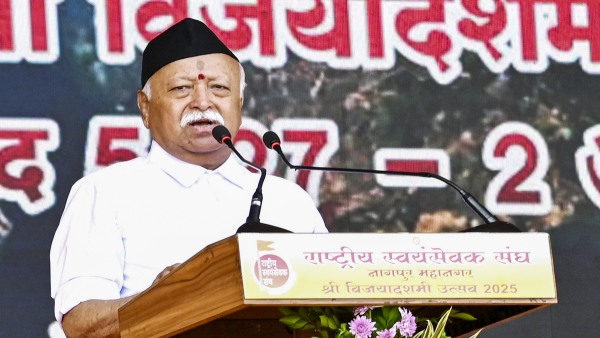India
oi-Prakash KL

Rashtriya
Swayamsevak
Sangh
(RSS)
chief
Mohan
Bhagwat
on
Thursday
expressed
apprehension
over
the
recent
political
upheavals
in
India’s
neighbouring
nations,
linking
them
to
public
discontent.
Speaking
at
the
RSS
headquarters
in
Nagpur,
he
stated,
“In
recent
years,
there
has
been
considerable
turmoil
in
our
neighbouring
countries.
The
regime
change
in
Sri
Lanka,
Bangladesh,
and
more
recently
Nepal
due
to
violent
outburst
of
public
anger
is
a
concern
for
us.” He
cautioned
that
forces
seeking
to
create
similar
disturbances
are
active
both
within
and
outside
India.
Rashtriya
Swayamsevak
Sangh
(RSS)
chief
Mohan
Bhagwat
expressed
concern
over
political
turmoil
in
neighboring
countries
like
Sri
Lanka,
Bangladesh,
and
Nepal,
linking
it
to
public
discontent,
and
also
addressed
global
challenges,
climate
change,
and
the
need
for
Indian
solutions,
emphasizing
the
importance
of
democratic
means
and
highlighting
the
RSS’s
centenary
year
at
an
event
attended
by
Union
Minister
Nitin
Gadkari,
Maharashtra
Chief
Minister
Devendra
Fadnavis,
and
former
President
Ram
Nath
Kovind.

Emphasising
democratic
processes,
he
added,
“The
forces
wanting
to
create
such
disturbances
in
Bharat
are
active
inside
as
well
as
outside
our
country…
However,
violent
outbursts
do
not
have
the
power
to
bring
about
the
desirable
change.
The
society
can
achieve
such
transformation
only
through
democratic
means.”
He
further
stressed
the
cultural
and
familial
ties
with
these
nations,
noting
that
their
peace
and
stability
are
a
“necessity
arising
out
of
our
natural
affinity.”
Security
and
Development
The
RSS
chief
acknowledged
the
government’s
success
in
curbing
the
Naxalite
movement,
attributing
it
to
state
action
and
public
disillusionment.
However,
he
highlighted
the
underlying
causes
of
the
insurgency
and
called
for
a
sustained,
comprehensive
approach.
“The
extremist
Naxalist
movement
has
been
largely
brought
under
control
due
to
the
firm
actions
of
the
government
and
the
realisation
among
people
about
the
hollowness
of
their
ideology
and
cruelty,”
Bhagwat
said.
“The
root
of
Naxalites’ popularity
in
these
areas
lay
in
exploitation
and
injustice,
lack
of
development,
and
absence
of
sensitivity…
Now
that
these
obstacles
have
been
removed,
a
comprehensive
action
plan
is
required
to
ensure
justice,
development,
goodwill,
empathy,
and
harmony
in
these
regions.”
Global
Challenges
and
a
Call
for
Indian
Solutions
Bhagwat
also
addressed
broader
global
issues,
pointing
to
a
disconnect
between
rapid
technological
progress
and
humanity’s
ability
to
adapt.
He
cited
ongoing
conflicts,
environmental
degradation,
and
the
erosion
of
social
bonds
as
key
problems.
“Across
the
globe,
scientific
progress…
presents
a
positive
picture.
However,
there
is
a
considerable
difference
between
the
pace
of
scientific
and
technological
progress
and
the
pace
at
which
humans
adapt
to
these,” he
remarked.
He
warned
of
“perverted
and
hostile
forces”
that
seek
to
destroy
cultural
and
traditional
unifiers,
and
posited
that
the
world
is
now
looking
for
answers
from
Indian
thought.
“In
Bharat
too,
we
are
experiencing
all
these
circumstances
in
various
ways.
The
world
is
eagerly
awaiting
solutions
that
are
based
on
Bharatiya
philosophy,”
he
stated.
Warning
on
Climate
Change
Highlighting
environmental
concerns,
Bhagwat
described
climate
change-induced
disasters
in
the
Himalayas
as
a
“warning
bell” for
India
and
South
Asia.
He
critiqued
the
prevailing
global
development
model
for
its
materialistic
focus.
“The
harmful
consequences
of
the
materialist
and
consumerist
development
model
adopted
worldwide…
are
increasingly
becoming
evident
everywhere,” he
said.
“In
Bharat
too,
due
to
the
same
model,
irregular
and
unpredictable
rainfall,
landslides,
drying
up
of
glaciers,
and
other
similar
effects
have
intensified
over
the
last
3-4
years…
The
occurrence
of
these
disasters
in
the
Himalayas
should
be
considered
as
a
warning
bell
for
Bharat
and
other
countries
of
South
Asia.”
The
event,
which
also
marked
the
commencement
of
the
RSS’s
centenary
year,
was
attended
by
a
gathering
of
dignitaries,
including
Union
Minister
Nitin
Gadkari,
Maharashtra
Chief
Minister
Devendra
Fadnavis,
and
former
President
Ram
Nath
Kovind,
who
served
as
the
chief
guest.
With
inputs
from
ANI







